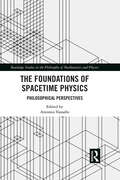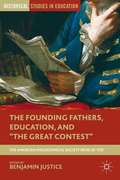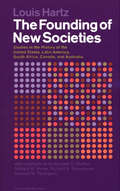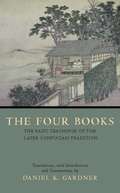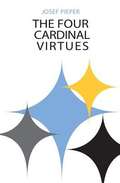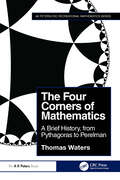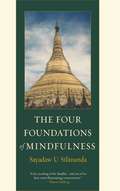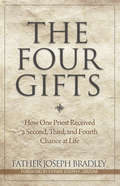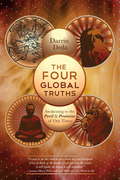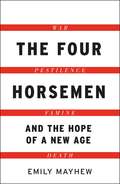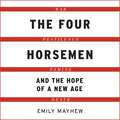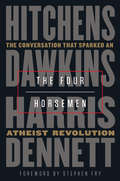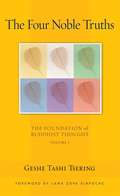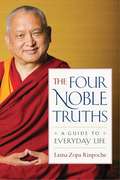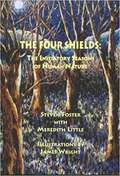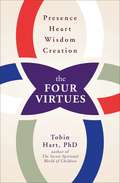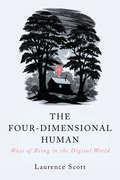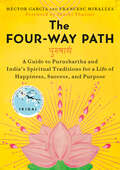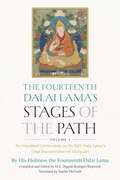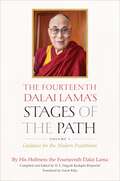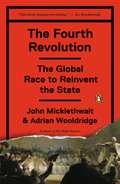- Table View
- List View
The Foundations of Spacetime Physics: Philosophical Perspectives (Routledge Studies in the Philosophy of Mathematics and Physics)
by Antonio VassalloThis book provides an up-to-date overview of the foundations of spacetime physics. It features original essays written by world-class experts in the physics and philosophy of spacetime. The foundational questions regarding the origin and nature of spacetime are branching into new and exciting directions. These questions are not restricted to the quantum gravity program but also arise in the context of a well-established theory like general relativity. Against the background of these quick and diverse developments, this volume features a broad range of perspectives on spacetime. Part I focuses on the nature of spacetime in non-quantum theories, such as Newtonian mechanics and relativity. Part II explores some intriguing conceptual implications of developing a quantum theory of spacetime. The Foundations of Spacetime Physics is an essential resource for scholars and advanced students working in philosophy of physics, philosophy of science, and scientific metaphysics.
The Founders and the Idea of a National University
by George Thomas"This book examines the ideas of the Founders with regard to establishing a national university and what those ideas say about their understanding of America. It offers the first study on the idea of a national university and how the Founders understood it as an important feature in an educational system that would sustain the American experiment in democracy. Their ideas about education suggest that shaping the American mind is essential to the success of the Constitution and that this is something that future generations would need to continue to do"--"Constituting the American Mind is about early efforts to establish a national university and what those efforts say about the nature and logic of American Constitutionalism. This book offers the first in depth study of the efforts to establish a national university from a constitutional perspective. While mostly noted in passing, the national university was put forward by every president from Washington to John Quincy Adams as a necessary supplement to the formal institutions of government; it would help constitute the American mind in a manner that carried forward the ideas the constitution rested on including, for example, the separation of the "civic" from the "theological. ""--
The Founding Fathers, Education, and "The Great Contest"
by Benjamin JusticeWinner of the 2014 Critics Choice Book Award of the American Educational Studies Association How did the Founding Fathers and their generation think about public education? One place to look is the same place they did: American Philosophical Society Contest of 1795. Sponsored by the nation's premier research organization, the contest challenged writers to imagine a system of mass, public education suited to the 'genius' of America. In this book, leading historians team together to unpack the mystery and significance of the contest: the essays it produced, the men who wrote and reviewed them, and the broader landscape of ideas about nationhood, race, gender, religion, higher education and social reform of the early American republic. The book also includes two chapters on historical research methods and, for the first time ever in print, all seven of the original essays.
The Founding of Aesthetics in the German Enlightenment
by Stefanie BuchenauWhen, in 1735, Alexander Gottlieb Baumgarten added a new discipline to the philosophical system, he not only founded modern aesthetics but also contributed to shaping the modern concept of art or 'fine art'. In The Founding of Aesthetics in the German Enlightenment, Stefanie Buchenau offers a rich analysis and reconstruction of the origins of this new discipline in its wider context of German Enlightenment philosophy. Present-day scholars commonly regard Baumgarten's views as an imperfect prefiguration of Kantian and post-Kantian aesthetics, but Buchenau argues that Baumgarten defended a consistent and original project which must be viewed in the context of the modern debate on the art of invention. Her book offers new perspectives on Kantian aesthetics and beauty in art and science.
The Founding of New Societies: Studies in the History of the United States, Latin America, South Africa, Canada, and Australia
by Louis HartzThe pioneering political scientist presents his “fragment theory” of class, culture and ideology in post-colonial societies around the world.In his groundbreaking work, The Liberal Tradition in America, Louis Hartz demonstrated that beneath America’s history of political conflict was an enduring consensus around Lockean liberal principles. In The Founding of New Societies, Hartz continues his examination of ideology and national identity with a study of five societies established by European migration and colonization. The diverse political and cultural traditions of the United States, Latin America, South Africa, Canada, and Australia share little in common. Yet, as Hartz demonstrates, they each represent a cultural fragment of the European countries from which they sprang. Each new society retains the ideology that had been dominant at home at the time of their founding. Extraordinarily influential when it was first published in 1964, The Founding of New Societies is a classic work of political science. Hartz’s fragment theory continues to offer powerful insight into today’s political landscape.
The Four Books: The Basic Teachings of the Later Confucian Tradition
by Daniel K. GardnerIn this engaging volume, Daniel Gardner explains the way in which the Four Books--Great Learning, Analects, Mencius, and Maintaining Perfect Balance--have been read and understood by the Chinese since the twelfth century. Selected passages in translation are accompanied by Gardner's comments, which incorporate selections from the commentary and interpretation of the renowned Neo-Confucian thinker, Zhu Xi (1130-1200).This study provides an ideal introduction to the basic texts in the Confucian tradition from the twelfth through the twentieth centuries. It guides the reader through Zhu Xi's influential interpretation of the Four Books, showing how Zhu, through the genre of commentary, gave new coherence and meaning to these foundational texts. Since the Four Books with Zhu Xi's commentary served as the basic textbook for Chinese schooling and the civil service examinations for more than seven hundred years, this book illustrates as well the nature of the standard Chinese educational curriculum.
The Four Cardinal Virtues: Prudence, Justice, Fortitude, Temperance
by Josef PieperIn The Four Cardinal Virtues, Josef Pieper delivers a stimulating quartet of essays on the four cardinal virtues. He demonstrates the unsound overvaluation of moderation that has made contemporary morality a hollow convention and points out the true significance of the Christian virtues.
The Four Corners of Mathematics: A Brief History, from Pythagoras to Perelman (AK Peters/CRC Recreational Mathematics Series)
by Thomas WatersThe Four Corners of Mathematics: A Brief History, from Pythagoras to Perelman describes the historical development of the ‘big ideas’ in mathematics in an accessible and intuitive manner. In delivering this bird's-eye view of the history of mathematics, the author uses engaging diagrams and images to communicate complex concepts while also exploring the details of the main results and methods of high-level mathematics. As such, this book involves some equations and terminology, but the only assumption on the readers’ knowledge is A-level or high school mathematics.Features Divided into four parts, covering Geometry, Algebra, Calculus and Topology Presents high-level mathematics in a visual and accessible way with numerous examples and over 250 illustrations Includes several novel and intuitive proofs of big theorems, so even the nonexpert reader can appreciate them Sketches of the lives of important contributors, with an emphasis on often overlooked female mathematicians and those who had to struggle.
The Four Foundations of Mindfulness
by Sayadaw U Silanada Ruth-Inge Heinze Larry RosenbergAn absolute essential of Buddhist thought and practice. In addition to practitioners of Insight meditation, those who engage in other meditation forms such as dzogchen, mahamudra, and zazen will find that The Four Foundation of Mindfulness provides new means of understanding how to approach and deepen their own practices. The entire Great Discourse is included here, coupled with a beautifully clear commentary from the great scholar-yogi, Venerable U Silananda.
The Four Gifts
by Joseph BradleyBy all rights, Father Joseph Bradley should be dead. If past usage of beer, marijuana, and cocaine didn't do the trick, then certainly heart failure should have. Instead, by the grace of God, he is alive, clean, sober, and a functioning Catholic priest with another man's heart beating in his chest. But it came at a huge cost. While Joe was in his late teens, his father died suddenly. The loss was devastating and Joe's emotional desolation found escapist bliss in a beer bottle and cocaine vial, and he pledged irrevocable devotion to both. The slide into the abyss was ugly, and Joe finally sought help because there was nowhere else to go--which led him to serve others as a Catholic priest. The day of Joe's ordination, an old friend came to the mass and announced for all to hear, "Well, now I can say I've seen a miracle." Joe functioned for fifteen years as a sober priest before his heart gave out from the same heart disease that killed his father. But another miracle came his way, and he was blessed with a new heart--a gracious gift from a family during the most painful moment of their lives. Joe has been granted the blessing of four gifts: faith, sobriety, a new heart, and a fulfilling ministry. As Father Joe says, "Gratitude inspired this book. I owe it to people who helped rescue me from alcohol and drugs, and I owe it to my heart donor for giving me yet another chance at life."
The Four Global Truths
by Darrin DrdaWith the planet increasingly threatened with catastrophe and perhaps even collapse, many seekers are looking to past, proven models to create meaningful change in their lives. One such model is Buddhism's Four Noble Truths: the reality of suffering, the root cause of suffering, the end of suffering, and the path to the end of suffering. This fresh, timely book taps and modifies that ancient wisdom to address the pressing environmental and spiritual crises facing us. In The Four Global Truths, author Darrin Drda contends that as global temperatures rise and natural systems decline, humanity is forced to confront the destructiveness of unfettered material progress and mechanistic thinking. He posits a more enlightened worldview that honors the interdependence of all forms of life and aspects of reality, a concept increasingly see as a practical and compassionate approach to averting disaster. Writing in a warm, open style recalling that of Eckhart Tolle in The New Earth, Drda integrates elements of Western philosophy, transpersonal psychology, deep ecology, modern cosmology, and quantum physics to get at the heart of worldwide ecological suffering. In the process he encourages a responsible and joyful--and ultimately healing--participation in this critical moment in life.About the Imprint: EVOLVER EDITIONS promotes a new counterculture that recognizes humanity's visionary potential and takes tangible, pragmatic steps to realize it. EVOLVER EDITIONS explores the dynamics of personal, collective, and global change from a wide range of perspectives. EVOLVER EDITIONS is an imprint of North Atlantic Books and is produced in collaboration with Evolver, LLC.From the Trade Paperback edition.
The Four Horsemen
by Emily MayhewThe Four Horsemen - War, Pestilence, Famine and Death - first appeared in the Book of Revelations a thousand years ago, but they continue to track us in our own time. This original and inspiring study bycelebrated historian Emily Mayhew traces the advances in science, technology and humanitarianism that are enabling us to take them on, one by one.'The beauty of The Four Horsemen is how she takes her quaking readers to the edge of the abyss . . . I was left moved and uplifted . . . [A] first-class example of popular science' The Times'[A] thoughtful and ultimately uplifting analysis of the unsung heroes of our age' IndependentIt begins in Mosul, our oldest surviving city, and the extraordinary coalition created in a matter of days to save its people from the worst horrors of the liberation battle against ISIS. As the city and the humanitarian operation that helped it to survive are restructured for a new age, Mayhew shows other people whose work gives us hope for the future, from the search to find new ways to discover and use antimicrobial medicines and the innovations in preventing the spread of deadly viruses; the laboratory work being taken to protect crops from disease and reduce famine, and why the potato, not the banana is the future; to the unique courage and resolution of those dedicated to securing the rights of the dead and their families. Standing in the way of the Horsemen is what Emily Mayhew calls, 'the most extraordinary alliance ever to come together in defence of our humanity.' These are the doctors, scientists, statisticians, engineers, peace negotiators, pharmacists, historians, forensic scientists, vaccinators and volunteers who are creating solutions to life and death problems which threaten us all. They are the new heroes of our age and this book is about them.
The Four Horsemen
by Emily MayhewThe Four Horsemen - War, Pestilence, Famine and Death - first appeared in the Book of Revelations a thousand years ago, but they continue to track us in our own time. This original and inspiring study bycelebrated historian Emily Mayhew traces the advances in science, technology and humanitarianism that are enabling us to take them on, one by one.'The beauty of The Four Horsemen is how she takes her quaking readers to the edge of the abyss . . . I was left moved and uplifted . . . [A] first-class example of popular science' The Times'[A] thoughtful and ultimately uplifting analysis of the unsung heroes of our age' IndependentIt begins in Mosul, our oldest surviving city, and the extraordinary coalition created in a matter of days to save its people from the worst horrors of the liberation battle against ISIS. As the city and the humanitarian operation that helped it to survive are restructured for a new age, Mayhew shows other people whose work gives us hope for the future, from the search to find new ways to discover and use antimicrobial medicines and the innovations in preventing the spread of deadly viruses; the laboratory work being taken to protect crops from disease and reduce famine, and why the potato, not the banana is the future; to the unique courage and resolution of those dedicated to securing the rights of the dead and their families. Standing in the way of the Horsemen is what Emily Mayhew calls, 'the most extraordinary alliance ever to come together in defence of our humanity.' These are the doctors, scientists, statisticians, engineers, peace negotiators, pharmacists, historians, forensic scientists, vaccinators and volunteers who are creating solutions to life and death problems which threaten us all. They are the new heroes of our age and this book is about them.
The Four Horsemen
by Emily MayhewIn lucid and energised prose, Emily Mayhew summons the four horsemen of the apocalypse; the collective threat to humanity bearing the names of war, pestilence, famine and death. As they began in Revelations and have remained in human consciousness ever since, spanning time and space and evolving as new scientific discoveries and advancements in technology alter the world.(P)2021 Quercus Editions Limited
The Four Horsemen: The Conversation That Sparked an Atheist Revolution
by Richard Dawkins Sam Harris Christopher Hitchens Daniel DennettIn 2007, Christopher Hitchens, Richard Dawkins, Sam Harris, and Daniel Dennett filmed a landmark discussion about modern atheism. The video went viral. Now in print for the first time, the transcript of their conversation is illuminated by new essays from three of the original participants and an introduction by Stephen Fry. At the dawn of the new atheist movement, the thinkers who became known as “the four horsemen,” the heralds of religion's unraveling—Christopher Hitchens, Richard Dawkins, Sam Harris, and Daniel Dennett—sat down together over cocktails. What followed was a rigorous, pathbreaking, and enthralling exchange, which has been viewed millions of times since it was first posted on YouTube. This is intellectual inquiry at its best: exhilarating, funny, and unpredictable, sincere and probing, reminding us just how varied and colorful the threads of modern atheism are. Here is the transcript of that conversation, in print for the first time, augmented by material from the living participants: Dawkins, Harris, and Dennett. These new essays, introduced by Stephen Fry, mark the evolution of their thinking and highlight particularly resonant aspects of this epic exchange. Each man contends with the most fundamental questions of human existence while challenging the others to articulate their own stance on God and religion, cultural criticism, spirituality, debate with people of faith, and the components of a truly ethical life.Advance praise for The Four Horsemen “The full, electrifying transcript of the one and only conversation between the quartet of luminaries dubbed the ‘four horsemen’ of the New Atheism, which took place in Washington, D.C., in 2007. Among the vast range of ideas and questions they discuss: Is it ever possible to win a war of ideas? Is spirituality the preserve of the religious? And, are there any truths you would rather not know?”—The Bookseller (UK) (starred review) “If thinking were a sport, these four would be national superstars—and reading The Four Horsemen feels like having a front-row seat at the all-star game. This is more than a book about atheism and religion—it’s a lesson in how to use our intellect to cut through the haze of delusion and misconception inherent in any human society.”—Tim Urban, writer of Wait But Why?
The Four Noble Truths
by Lama Thubten Zopa Rinpoche Geshe Tashi Tsering Gordon McdougallThe four noble truths are well known as the Buddha's first and most essential explanation of his enlightened realizations. The truths diagnose the human existential crisis--suffering and its origin--and prescribe a solution--cessation and the path. To understand the four noble truths is to understand Buddhism as a whole. In The Four Noble Truths, Geshe Tashi draws on his decades of training in Tibetan Buddhism to illuminate these truths for a modern audience. His respectful engagement with Buddhists outside his own tradition and his insights into Western culture make this book refreshing. It will reward even those already acquainted with the fundamentals of Buddhism. The Four Noble Truths is the first of six stand-alone volumes in the Foundation of Buddhist Thought series.
The Four Noble Truths: A Guide to Everyday Life
by Lama Zopa RinpocheThe Buddha’s profound teachings on the four noble truths are illuminated by a Tibetan master simply and directly, so that readers gain an immediate and personal understanding of the causes and conditions that give rise to suffering as well as the spiritual life as the path to liberation. Experiential teachings on the Dharma by the Tibetan master Lama Zopa Rinpoche, written in a lively manner to inspire and motivate both general readers and experienced Buddhist practitioners to persist in understanding the nature or truth of suffering, its causes, and the remedies to secure the end of all suffering—the four noble truths of the path, the Buddha’s psychological method for us to break free from suffering. Speaks intimately and directly to the reader about how the principles of the four noble truths are to be applied to one’s day-to-day spiritual life as the path to liberation.
The Four Shields: The Initiatory Seasons of Human Nature
by Steven Foster Meredith LittleThe Four Shields: The Initiatory Seasons of Human Nature by Steven Foster and Meredith Little.
The Four Virtues
by Tobin HartIn a world with greater knowledge, more advanced technology, and more groundbreaking innovation than ever at our fingertips, we are still looking to find our way. We are still searching for that essential insight on how to lead a really good life. By drawing from across tradition and time, from neuroscience to ancient wisdom, Tobin Hart reveals that we all possess four essential virtues--Presence, Heart, Wisdom, Creation--that help us to build, balance, and integrate our psychological and spiritual life on earth. While these virtues may be universal, the way they live in each of us is unique. With the Spiritual Assessment Matrix (SAM) and expert practices and tools, this highly accessible, thought-provoking guide shows us how to grow and activate these powers from the inside out. When in balance, these four virtues serve as a field guide to the inner life, bringing you heart and wisdom as well as helping you recognize beauty, rekindle awe, and find your own voice.hether religious or secular--looking to live by a contemporary set of ethics to frame their self-development and happiness. Highly accessible, thought provoking, and interactive, The Four Virtues provides a groundbreaking way to engage and flourish in life.
The Four-Dimensional Human: Ways of Being in the Digital World
by Laurence ScottYou are a four-dimensional human. Each of us exists in three-dimensional, physical space. But, as a constellation of everyday digital phenomena rewires our lives, we are increasingly coaxed from the containment of our predigital selves into a wonderful and eerie fourth dimension, a world of ceaseless communication, instant information, and global connection. Our portals to this new world have been wedged open, and the silhouette of a figure is slowly taking shape. But what does it feel like to be four-dimensional? How do digital technologies influence the rhythms of our thoughts, the style and tilt of our consciousness? What new sensitivities and sensibilities are emerging with our exposure to the delights, sorrows, and anxieties of a networked world? And how do we live in public with these recoded private lives? Laurence Scott—hailed as a “New Generation Thinker” by the Arts and Humanities Research Council and the BBC—shows how this four-dimensional life is dramatically changing us by redefining our social lives and extending the limits of our presence in the world. Blending tech-philosophy with insights on everything from Seinfeld to the fall of Gaddafi, Scott stands with a rising generation of social critics hoping to understand our new reality. His virtuosic debut is a revelatory and original exploration of life in the digital age.
The Four-Way Path: A Guide to Purushartha and India's Spiritual Traditions for a Life of Happiness, Success, and Purpose
by Francesc Miralles Héctor GarcíaAn inspiring guide to achieving happiness through purushartha (pronounced poo-roo-shar-tuh), or the four ultimate goals of human life, by the bestselling authors of Ikigai and The Book of Ichigo IchieIn our complex modern world, it can be easy to doubt we&’re living the life we&’re meant to be living. But the authors of the global bestseller Ikigai, about the Japanese concept that has helped millions of people discover their reason for being, are now on a mission to show how the ancient Hindu concept of purushartha provides a powerful framework for charting a path toward a life of purpose and fulfillment .Having spent a great deal of time in India, the authors were inspired to write a book honoring the culture they came to appreciate. In The Four-Way Path, they draw on practices from India&’s numerous spiritual traditions to show how to foster happiness and achievement by cultivating the four components of purushartha:your kama, or what you love doingyour dharma, or what the world needs from youyour artha, or what you need to sustain your lifeyour moksha, or your truest, most actualized selfIf you already know what your purpose in life is, then this book provides a blueprint for living in accordance with your purushartha. If you don&’t yet know, then it will give you the tools to start the adventure of understanding yourself better, and to bring inspiration, beauty, peace, and purpose to your daily life.
The Fourteenth Amendment and the Privileges and Immunities of American Citizenship
by Kurt T. LashThis book presents the history behind a revolution in American liberty: the 1868 addition of the Privileges or Immunities Clause of the Fourteenth Amendment. This exhaustively researched book follows the evolution in public understanding of "the privileges and immunities of citizens of the United States," from the early years of the Constitution to the critical national election of 1866. For the first 92 years of our nation's history, nothing in the American Constitution prevented states from abridging freedom of speech, prohibiting the free exercise of religion, or denying the right of peaceful assembly. The suppression of freedom in the southern states convinced the Reconstruction Congress and the supporters of the Union to add an amendment forcing the states to respect the rights announced in the first eight amendments. But rather than eradicate state autonomy altogether, the people embraced the Fourteenth Amendment that expanded the protections of the Bill of Rights and preserved the Constitution's original commitment to federalism and the principle of limited national power.
The Fourteenth Dalai Lama's Stages of the Path, Volume 2: An Annotated Commentary on the Fifth Dalai Lama's Oral Transmission of Mañjusri
by His Holiness the Dalai LamaCentral to Buddhism is knowing our own minds. Until we do, we are driven by unconscious, often destructive desire and aversion.The Fourteenth Dalai Lama&’s Stages of the Path: An Annotated Commentary on the Fifth Dalai Lama's Oral Transmission of Mañjusri is the second volume of the Dalai Lama&’s outline of Buddhist theory and practice. Having introduced Buddhist ideas in the context of modern society in volume one, the Dalai Lama turns here to a traditional presentation of the complete path to enlightenment, from developing faith in the Dharma to attaining the highest wisdom. This book, compiled by the revered Tibetan lama Dagyab Rinpoché, comments on the Fifth Dalai Lama&’s stages of the path titled Oral Transmission of Mañjusri. The volume will appeal to all readers interested in the Dalai Lama&’s works, both those new to Buddhism and those looking to deepen their understanding of the Tibetan presentation of the Buddhist path.
The Fourteenth Dalai Lama's Stages of the Path, Volume One: Guidance for the Modern Practitioner
by His Holiness the Dalai LamaDiscover His Holiness the Dalai Lama&’s advice for finding happiness, helping others, and applying insights from Buddhist thought to everyday life—for a life of greater harmony, meaning, and joy, for ourselves, others, and in our world.This first volume of The Fourteenth Dalai Lama&’s Stages of the Path shares His Holiness&’s teachings on specific topics of vital relevance to contemporary life: - how kindness and compassion are the foundation for individual happiness and world peace; - how we can solve manmade problems; - how Buddhism does not conflict with modern science and can actually contribute to its advancement; - how gender equality is fundamental for a decent and just society; - and much more. His Holiness&’s messages on these topics will be of value to all readers, Buddhists and non-Buddhists alike. These teachings embody the Dalai Lama's generous warmth and humor, his expertise in presenting important Buddhist ideas, and his ability to inspire us toward greater kindness and happiness.
The Fourth Revolution
by John Micklethwait Adrian WooldridgeFrom the bestselling authors of The Right Nation, a visionary argument that our current crisis in government is nothing less than the fourth radical transition in the history of the nation-state Dysfunctional government: It's become a cliché, and most of us are resigned to the fact that nothing is ever going to change. As John Micklethwait and Adrian Wooldridge show us, that is a seriously limited view of things. In fact, there have been three great revolutions in government in the history of the modern world. The West has led these revolutions, but now we are in the midst of a fourth revolution, and it is Western government that is in danger of being left behind. Now, things really are different. The West's debt load is unsustainable. The developing world has harvested the low-hanging fruits. Industrialization has transformed all the peasant economies it had left to transform, and the toxic side effects of rapid developing world growth are adding to the bill. From Washington to Detroit, from Brasilia to New Delhi, there is a dual crisis of political legitimacy and political effectiveness. The Fourth Revolution crystallizes the scope of the crisis and points forward to our future. The authors enjoy extraordinary access to influential figures and forces the world over, and the book is a global tour of the innovators in how power is to be wielded. The age of big government is over; the age of smart government has begun. Many of the ideas the authors discuss seem outlandish now, but the center of gravity is moving quickly. This tour drives home a powerful argument: that countries' success depends overwhelmingly on their ability to reinvent the state. And that much of the West--and particularly the United States--is failing badly in its task. China is making rapid progress with government reform at the same time as America is falling badly behind. Washington is gridlocked, and America is in danger of squandering its huge advantages from its powerful economy because of failing government. And flailing democracies like India look enviously at China's state-of-the-art airports and expanding universities. The race to get government right is not just a race of efficiency. It is a race to see which political values will triumph in the twenty-first century--the liberal values of democracy and liberty or the authoritarian values of command and control. The stakes could not be higher.
